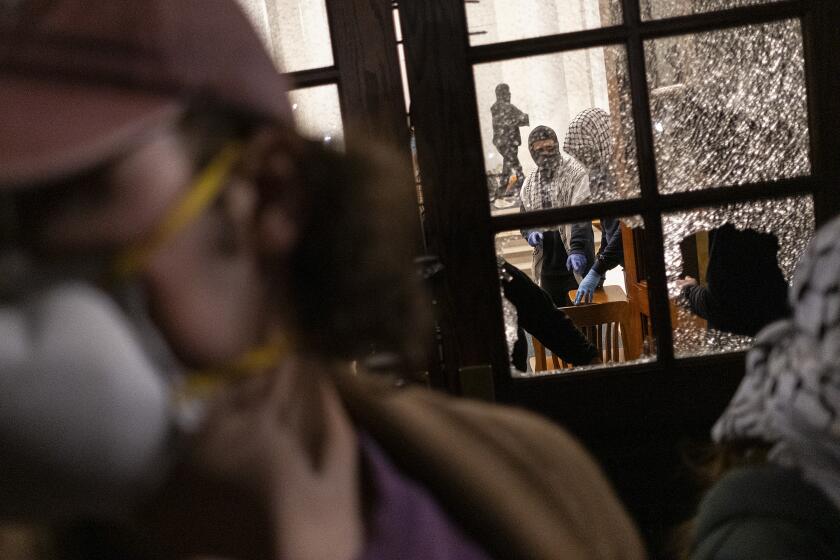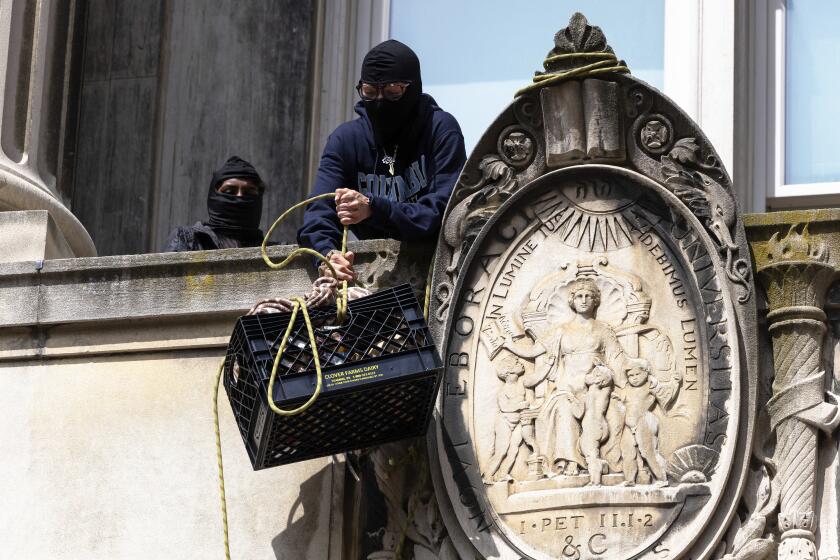Former CIA Agent Looks for Financial Links to Hussein
After nearly two decades on the sidelines, Duane “Dewey” Clarridge, the legendary CIA officer who played a key role in the Reagan administration’s secret war in Nicaragua, is back in the game -- this time in Iraq and as a private citizen.
Clarridge has launched his own self-financed investigation into alleged prewar financial dealings between Saddam Hussein’s regime and France and Russia. And he has arranged to keep U.S. intelligence agencies briefed on what he uncovers.
“It will be a huge bombshell if we can pull it off,” Clarridge said in a recent interview, adding that he was collaborating with several people he preferred not to identify. “I think the White House will be delighted.”
During his 33-year CIA career, Clarridge earned a reputation as a hard-liner who was not afraid to take chances. It was his idea to undermine Nicaragua’s leftist government in the 1980s by mining its harbors -- a ploy the World Court later ruled illegal. In 1991, three years after retiring with an official reprimand, Clarridge was indicted for lying to Congress about the Iran-Contra affair. He was pardoned by President George H.W. Bush before going to trial.
Now, as the current Bush administration struggles with the delicate task of transferring power to a new government in Baghdad while trying to fend off insurgents and placate allies, Clarridge has reemerged as a freelancer.
He has lost none of his fire.
Clarridge is offering unpaid advice to Iraqi political figures, including Ahmad Chalabi, the controversial exile leader long favored by the Bush administration but now suspected of leaking U.S. secrets to Iran. Clarridge scoffs at those allegations, and at a recent U.S.-backed raid on Chalabi’s Baghdad offices.
“The raid ... did him a great favor by destroying his reputation as a U.S. toady,” he said. “In the old days, we would have orchestrated an operation like that to boost his credentials.”
Clarridge has been advising Chalabi’s Iraqi National Congress faction on what kind of intelligence agency the new Iraqi government should build.
His idea of a good intelligence agency came through in his stinging criticism of the present-day CIA, which he believes has grown far too cautious. “An intelligence agency has to take risks, and it’s going to get into a little -- and sometimes a lot -- of trouble,” he said.
After he retired from the CIA, Clarridge took an executive position in defense firm General Dynamics’ international marketing division.
Since 1996, he has been part of a group of conservative activists who supported and promoted Chalabi as a vehicle for overthrowing Hussein and installing a pro-American regime in Baghdad.
During the Clinton administration, Clarridge teamed up with retired Army Gen. Wayne A. Downing, a special operations expert, to develop a plan to train an Iraqi exile force to lead a revolt against Hussein, backed by U.S. air power. The Clinton administration spurned the plan. Former Marine Gen. Anthony C. Zinni, then chief of the U.S. Central Command, called it a potential “Bay of Goats” -- a reference to the failed Bay of Pigs invasion of Cuba. But Clarridge said it could have caused “a lot of trouble in Iraq.”
Now he is trying to discredit France, Russia and other governments that have opposed President Bush’s Iraq policies.
Clarridge returned last week from a trip to Iraq in search of evidence that French politicians took secret payoffs from Hussein in the 1980s; that Russia received illegal Iraqi oil transshipped through Iran; and that major international companies -- as well as foreign governments -- helped Hussein’s alleged bid to develop weapons of mass destruction.
He said those economic interests were the real reasons those countries opposed the invasion of Iraq. “I think the world needs to know why some countries didn’t want Saddam Hussein removed from power,” he said.
Other veterans of the Iran-Contra days are working in the present administration. They include Elliott Abrams, the top National Security Council official for the Middle East, and John D. Negroponte, who will become the first U.S. ambassador to Iraq.
Yet in 2001, Downing, who had been named Bush’s deputy national security advisor for combating terrorism, was unable to bring Clarridge on as his chief deputy because of complaints from unidentified opponents, Clarridge said.
“All I know is that somebody -- or some bodies -- thought I would be a liability,” he said.
Still, Clarridge has extensive contacts in Washington. He has twice been named to special task forces set up by the Defense Science Board, which advises Defense Secretary Donald H. Rumsfeld.
“I was in the Washington thing for 33 years and then in the defense business,” Clarridge said. “I can pick up the phone and call an awful lot of people at the Pentagon, the State Department and Congress.”
As he returns to action, Clarridge is pursuing both policy goals and profit.
For one thing, he said, the U.S. government is seeking contractors to train bodyguards for Iraqi officials. “I know a lot of people and companies who can do that sort of business, and I’ve been trying to get a few together to bid jointly instead of against each other,” he said.
Clarridge said he would get a small finder’s fee if a deal came through.
Two years ago, Clarridge set up two U.S.-based consulting firms that offer advice to companies doing business in global hot spots such as Iraq -- Dax Resources Corp., based outside Washington near CIA headquarters, and Dax & Associates, based in San Diego, where Clarridge lives. “Dax P. LeBaron” was an alias Clarridge used at the CIA.
Milt Bearden, a retired senior CIA officer who knows Clarridge, described him as “an unrepentant cold warrior.”
“Anything he’s doing wouldn’t be motivated by trying to turn a buck, but because he believes it’s the right thing to do,” Bearden said.
Clarridge, 72, was chief of the CIA’s Latin America division in 1981, when President Reagan began stepping up U.S. involvement in the region. Clarridge became a favorite of CIA Director William J. Casey, who “loved his flamboyance in everything from his dress to his approach to tough problems,” Bearden said.
With his taste for white trousers and blue blazers with gold buttons, “he always looked like he was heading off to a yacht outing,” Bearden said.
Clarridge also served as chief of the CIA’s Europe division and created and led the agency’s Counterterrorism Center.
“No one does everything right, but I admire his aggressive stance,” said former CIA Director R. James Woolsey, who, like Clarridge, was in favor of the Iraq war. “He has an appetite for creativity and the offense that is badly needed at the CIA.”
Former CIA officer Vincent Cannistraro, on the other hand, said, “He was very effective as an operations officer, but he cut corners and skirted the law.”
More to Read
Get the L.A. Times Politics newsletter
Deeply reported insights into legislation, politics and policy from Sacramento, Washington and beyond. In your inbox three times per week.
You may occasionally receive promotional content from the Los Angeles Times.






